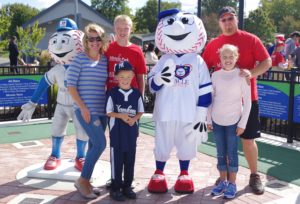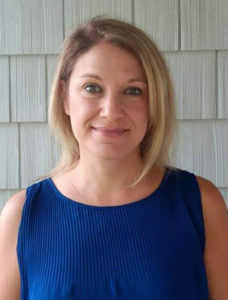Sellstrong
Deanna Reinhart brings on the challenges
Deanna Reinhart isn’t afraid to get in the trenches. She did it as a nursing home administrator. She did it when she switched careers and entered medical sales for Seneca Medical (now Concordance Healthcare Solutions). She did it when she took responsibility for servicing a large IDN in northwest Ohio for Concordance. And she did it when she acted as the mascot for her youngest son’s Miracle League baseball team in Findlay, Ohio.
“When I find myself feeling challenged, I stop and think, ‘This is only going to make me stronger,’” says Reinhart, senior account manager for Concordance. “If I am going to be responsible for managing something, I want to understand all aspects of the job. If you want respect, you have to earn it. You have to show people you are not afraid to get ‘dirty.’”
Reinhart was born in Michigan and raised in Clyde, Ohio. Her late father, John Bommarito, retired in 2010 following a career in industrial procurement. Her mother, Trudy Bommarito, is a retired childcare provider.
“My dad had a very strong work ethic, barely missing any work and working long hours,” she says. “Since my mom was a childcare provider, she was at home with me and my siblings. Both my parents taught me compassion for people. They were always willing to help others, no matter what.”
Long-term interest
Reinhart graduated from Ohio University with a degree in long-term care administration. She also received a certificate in gerontology. But her interest in long-term care goes back much further.
“To be honest, my interest came from my Grandma being in a nursing home. I got comfortable visiting her, growing up and interacting with the residents, [and] the residents intrigued me. To this day, I still remember the names of the residents that I would frequently see and what they looked like.”
In high school, she took classes to become a State Tested Nursing Assistant, after which she worked at a local nursing home before going to college.
“Working as an STNA is extremely rewarding,” she says. “Not only do you get to help the residents and make a difference in their lives, but you also get to learn their history and get to know their families. It is an amazing opportunity.”
After graduating from Ohio University, Reinhart became business office manager for a skilled nursing facility in which she had interned during school. Later, she became administrator at another facility. After that, she worked with an Ohio-based chain, first as assistant administrator at one of their skilled nursing facilities and then executive director for one of the assisted livings. She assumed several administrator roles for the organization.
Reinhart says the best things about her experiences in long-term care were the residents, the employees, and the satisfaction of making a difference in people’s lives.
“I truly enjoyed the residents. They saw me through two pregnancies, they would talk to my belly. When my babies were born, my husband and I would bring them in to see the residents; they would hold them and gush all over them. I wouldn’t trade that for the world. Those are memories that I will always hold near and dear to my heart.”
During those years, Reinhart learned she was not afraid to get in the trenches. “I wanted to do whatever I could to make my organization and my employees successful, and provide the best care and home for my residents (customers),” she says. “I would occasionally cook dinner, serve the residents, and assist them with care if we were having staffing issues. The residents loved when I would cook or wait on them during meals. I would transport them to medical appointments if needed, which allowed me to get to know them.” She recalls snowy weekend trips to the facility to ensure things were running smoothly. One evening she got the snow blower out, so she wouldn’t have to call in the maintenance person. “I wound up breaking it, so maybe I wasn’t so helpful,” she says.
“After transitioning multiple times to different nursing homes in different locations, I realized that I was like a chameleon. I was able to adapt to my surroundings, adjust to the environment and make an impact in my short time there.”
Medical sales
These skills have suited her well in medical sales, first calling primarily on the long-term-care market, and now, a large IDN.
“I had two young children at the time and thought I needed to expand my horizons while continuing to use my long-term care experience,” she says. “When the opportunity arose [at Seneca Medical], I felt I had the best of both worlds. I still was involved in long-term care, but I also had the opportunity to share my experience with the healthcare distribution industry.
“My experience working in nursing homes – at one point, being the customer who needed supplies to provide care – helped me to understand, as a rep, the urgency of having product available when needed.”
Truth be told, sales and marketing activities weren’t entirely foreign to her. “One of my responsibilities [as a long-term-care administrator] was census development, which is marketing, that is, selling your building and why it is better than the rest,” she says.
At Seneca, she was initially responsible for developing new business and managing existing accounts. She then became a regional director, primarily overseeing long-term care in Ohio, Michigan and Indiana.
In September 2016, following the merger of Kreisers, MMS – A Medical Supply Company, and Seneca Medical to form Concordance Healthcare Solutions, Reinhart accepted a new role – senior account manager with responsibility for a large IDN.
“I remember the first month of taking over,” she says. “I felt as if the eight years [in medical sales] I had under my belt went out the window. I had experience in all markets, but never to the magnitude of my new role. I frequently would say, ‘How am I going to figure this stuff out?’ Thankfully, I have wonderful leadership, internal support and a warehouse that helped me along the way.
“The health system customer is definitely different than most nursing home customers,” she says. In nursing homes, people still batch orders and call, fax or email them. But IDNs transmit them by EDI. What’s more, the typical IDN has many decision-makers. “I don’t necessarily have direct access to the end users of product at all times,” she says. “It is a more centralized, streamlined approach vs. long-term care, where I could pretty much go directly to the end user.
“One commonality between the IDN and long-term care is they are serving individuals in need of care, and they need the appropriate supplies for that to happen,” she continues. “Again, having been on the other side as a customer helps me realize I am going to do whatever I can to get product to make their organization be successful.
“It took a while to get used to, but now I’m in a rhythm.”
Reinhart and her husband, Gary, live in Jenera, Ohio, in northwest Ohio. They have three children: Quinn, 13, a sports lover; Hannah, 11, who has been taking private cooking classes; and Evan, 7, who is on the autism spectrum and diagnosed with epilepsy, and who loves music therapy and playing baseball for the Miracle League.

